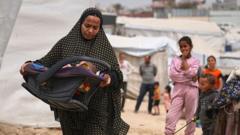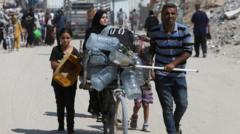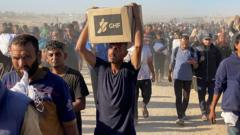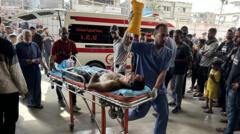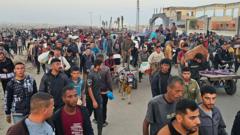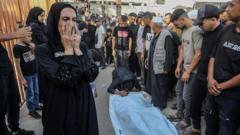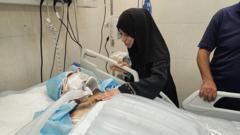The ongoing war in Gaza has severely impacted pregnancy and childbirth, contributing to a rise in underweight infants, miscarriages, and maternal health crises. Faced with a lack of medical supplies and proper nutrition, mothers are coping with the dual fears of delivering healthy babies and ensuring their survival amidst extreme hardships.
Desperate Struggles: Pregnancy and Childbirth in Gaza Amid Conflict

Desperate Struggles: Pregnancy and Childbirth in Gaza Amid Conflict
Expectant mothers face unprecedented dangers in Gaza as conflict escalates, with food shortages and healthcare scarcity leading to devastating outcomes for mothers and infants.
In Gaza, amidst a brutal conflict, the circumstances surrounding pregnancy and childbirth are dire as expectant mothers grapple with extreme challenges. The ongoing blockade and bombardment have led to severe shortages of essential resources, with the UN reporting that one in ten newborns is now underweight or born prematurely. Tragically, there has also been a marked increase in miscarriages, stillbirths, and congenital abnormalities among infants in the region.
Malak Brees, currently seven months pregnant, expressed her fears over the bombings and evacuation orders, worrying for her baby's well-being. “I’m frightened that I could have a premature birth at any time and that my amniotic fluid isn’t enough,” she shared. Previous complications like the loss of amniotic fluid due to malnutrition highlight the mounting risks associated with pregnancy in such a volatile environment.
As the Israeli blockade remains largely intact, healthcare services have become critically insufficient. Hospitals like Nasser in Khan Younis have been overwhelmed since a nearby facility was rendered inoperative following an Israeli strike in May. This attack is a part of a series directed at healthcare establishments, which Israel claims target Hamas infrastructure, but results in profound consequences for those in need of care.
Women who do manage to reach hospitals often experience temporary treatments and are discharged within hours, regardless of serious complications. Sandra Killen, an American nurse working in Gaza, revealed that many mothers are sent home shortly after giving birth, sometimes after C-sections, with limited follow-up care. Consequently, most high-risk newborns do not receive the intensive care typically needed.
Psychological distress among pregnant women has surged, with many fearing for their unborn baby's health. Dr. Ahmad al-Farra of Nasser hospital noted the heartbreak experienced by mothers aware that they and their babies lack proper nutrition and monitoring. Coupled with insufficient support for breastfeeding, the situation is exacerbated by a dismal food supply, leading to further infant malnutrition.
Aya al-Skafi's painful account exemplifies the uphill struggle many face. After her daughter's birth during a brief ceasefire, malnutrition rendered Aya unable to produce enough breast milk. Despite desperate pleas for help, her four-month-old baby died due to complications that arose from food shortages.
While breastfeeding remains a recommended practice, as highlighted by nurse Sandra Killen, many mothers are unable to sustain it due to their own health challenges. Some organizations have stepped in to offer support, but the scale of the crisis means that countless women face despair and loss.
The heartbreaking stories continue with devastating incidents of loss. Jomana Arafa, who had recently given birth to twins, received tragic news that a missile strike had claimed the lives of her and her newborns, underscoring the unrelenting danger surrounding pregnancies in Gaza.
Once a hopeful time, pregnancy has transformed into one defined by anxiety, fear, and the struggle to survive, shifting the narrative to one where new life represents both hope and profound vulnerability amidst persistent conflict.








